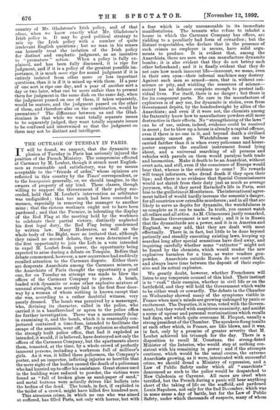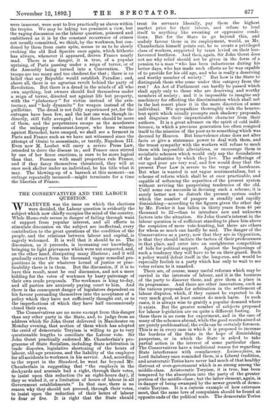THE OUTRAGE OF TUESDAY IN PARIS.
IT will be found, we suspect, that the dynamite ex- plosion of Tuesday in Paris has seriously injured the position of the French Ministry. The compromise effected at Carmaux by M. Loubet, though it struck most English- men as reasonable and satisfactory, was by no means acceptable to the "friends of order," whose opinions are reflected in this country by the Times' correspondent, or to the bourgeoisie generally, or, we should imagine, to the -owners of property of any kind. These classes, though willing to support the Government if their policy suc- ceeded, held that M. Loubet's intervention as arbitrator was undignified ; that too much had been conceded to menace, especially in removing the manager to another mine ; that the riotous workmen ought not to have been pardoned ; and that the Premier, in tolerating the display of the Red Flag at the meeting held by the workmen to celebrate their partial victory, distinctly neglected his first legal duty, the Red Flag being condemned by written law. Many Moderates, as well as the whole body of the Bight, were so irritated that, although they raised no second debate, they were determined on the first opportunity to join the Left in a vote intended to expel M. Loubet from power, the opportunity being expected to arise during a debate on Tonquin. Before that debate commenced, however, a new occurrence had suddenly recalled attention to the Carmaux dispute. Either there are desperate Anarchists among the Carmaux miners, or the Anarchists of Paris thought the opportunity a good one, for on Tuesday an attempt was made to blow the offices of the Carmaux Company to pieces. A bomb, loaded with dynamite or some other explosive mixture of unusual strength, was secretly laid in the first floor door- way by a woman of whom nothing is known except that she was, according to a rather doubtful witness, very poorly dressed. The bomb was perceived by a messenger, who, divining its character, called in the police, who carried it in a handkerchief or apron to the police office for further investigation. There was a momentary delay in examining it, and the bomb, which it is reasonably con- jectured contained a time-fuse, intended to facilitate the escape of the assassin, went off. The explosion so shattered the strongly built police office, that had it exploded as intended, it would, it is believed, have destroyed not only the offices of the Carmaux Company, but the apartments above them, tenanted, at the time, by a whole crowd of perfectly innocent persons, including a workroom full of milliner's girls. As it was, it killed three policemen, the Company's porter, and an inspector, inflicting injuries so horrible that the mere sight of the bodies caused the death of a policeman who had hurried up to offer his assistance. Great stones used in the building were reduced to powder, the victims were found as "full of broken glass as sand-paper of sand," and metal buttons were actually driven like bullets into the bodies of the dead. The bomb, in fact, if exploded in thelnidst of a crowd, might have killed five hundred men.
This atrocious crime, in which no one who was aimed at suffered, has filled Path, not only with horror, but with a fear which is only unreasonable in its immediate manifestations. The tenants who refuse to inhabit a house in which the Carmaux Company has offices, are yielding to a peculiarly bad form of cowardice ; but the distant respectables, who declare that in the presence of such crimes no employer is secure, have solid argu- ments to produce. It is evident that, among the Anarchists, there are men who can manufacture dynamite bombs ; it is also evident that they do not betray each other beforehand ; and it is finally evident that they do not care how much innocent life—innocent, we mean, even in their own eyes—their infernal machines may destroy Against such men so armed—men, that is, without con- science or pity, and wielding the resources of science— society has no defence complete enough to protect indi- vidual lives. For itself, there is no danger ; but there is for its component parts. No care in the manufacture of explosives is of any use, for dynamite is stolen, even from Government depots, by the hundredweight by allies of the Anarchists ; and even if it were not, the chemists among the fraternity know how to manufacture powders still more destructive in their effects. No "strengthening of the laws" can be of use, unless, indeed, evidence could be received in secret ; for to blow up a house is already a capital offence, even if there is no one in it, and beyond death a civilised community cannot go. Watchfulness can hardly be carried farther than it is when every policeman and house- porter suspects the smallest instrument found lying about, and a universal searching of all persons and vehicles with parcels on them would paralyse both trade and locomotion. Make it death to be an Anarchist, without overt acts, and still, even if the conscience of Europe would bear that, whence is the evidence to come ? No rewards will tempt informers, who dread death if they open their lips; and there is no evidence that Special Commissioners would not shrink from their duty just as much as average jurymen, who, if they saved Ravachol's life in Paris, sent him to the guillotine at Montbrison . The international agree- ment talked of would hardly increase the assassin's danger, for all countries now extradite murderers ; and in all that are likely to serve as depots for dynamite, the watchfulness is as complete as it can be made. In truth, yon cannot watch all cellars and all attics. As M. Clemenceau justly remarked, the Russian Government is not weak ; and. it is in Russia that the dynamitards are a power, and it is in America and England, we may add, that they are dealt with most effectually. There is, in fact, but little to be done beyond patiently and steadily executing existing laws, keeping up searches long after special sensations have died away, and inquiring carefully whether some " extinctor " might not be found by the chemists, which would render the new explosives harmless for a time, as water renders gun- powder. Anarchists outside Russia do not court death, and always leave time between the deposit of their explo- sive and its actual explosion.
We greatly doubt, however, whether Frenchmen will listen to any temperate counsel of this kind. Their instinct is to " rush " their enemies, whether in civil life or on the battlefield, and they will hold the Government which waits to be either weak or cowardly. The debate in the Chamber on Wednesday showed many of the symptoms visible in France when men's minds are growing unhinged by panic or excitement. The Deputies, it is true, voted with the Govern- ment; but they voted with suspicious unanimity, and amidst a scene of uproar and personal recriminations which recalls bad days, and which quite overcame M. Floquet, usually a strong president of the Chamber. The speakers flung insults at each other which, in France, are like blows, and it was, in fact, only by a promise of greater severity that M. Loubet achieved his triumph for the day. There is a disposition to recall M. Constans, the strong-fisted Minister of the Interior, who would stop at nothing con- sistent with his remaining in power ; and if the attempts continue, which would be the usual course, the extreme Anarchists growing, as it were, intoxicated with successful crime, we should dread a Ministry of repression, and a Law of Public Safety under which all " anarchists " denounced as such to the police would be despatched to New Caledonia or Cayenne. All races are cruel when terrified, but the French during a panic will bear anything short of the taking of life on the scaffold, and pardoned Louis Napoleon, not only for the 2nd December, which was in some sense a day of battle, but for the Law of Public Safety, under which thousands of suspects, many of whom were innocent, were sent to live practically as slaves within the tropics. We may be taking too pessimist a view, but the raging discussion on the labour question, Poisoned and embittered as it is by the constant recurrence of crimes not usually committed, we think, by the workmen, but con- doned by them from caste spite, seems to us to be slowly evoking the old Red Spectre once again, which hitherto has always, whenever it appeared, driven France nearly mad. There is no danger, it is true, of a popular uprising, of Paris passing under a reign of terror, or of the Assembly being turned into a Convention. The troops are too many and too obedient for that ; there is no belief that any Republic would establish Paradise ; and, above all, there is no agrarian revolt behind the party of Revolution. But there is a dread in the minds of all who own anything, lest owners should find themselves under a reign of terror, directed not against life but property, with the " plutocracy " for victim instead of the aris- tocracy, and "holy dynamite" for weapon instead of the guillotine. The dread is not fully experienced yet, for the outrages have been few, and the last one was, though in- directly, still fully avenged ; but if there should be more of them, and the perpetrators escape as the murderers of the unhappy restaurant-keeper, who bore witness against Ravachol, have escaped, we shall see a ferment in Paris and France such as we have not witnessed since the attempt of Orsini to assassinate, or terrify, Napoleon III. Even now M. Loubet will carry a severe Press Law, intended to drive the disease in ; and France once stirred by one of her fierce emotions, is sure to be more logical than that. Persons with small properties rule France, and if they fancy themselves threatened, they will at once seek shelter under an individual, be his title what it may. The blowing-up of a barrack at this moment—an outrage repeatedly menaced—might terminate for a time the liberties of France.







































 Previous page
Previous page